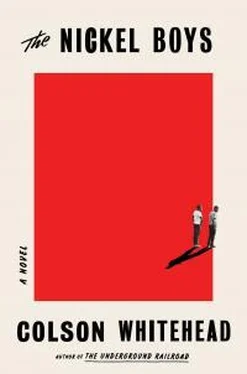Колсон Уайтхед - The Nickel Boys
Здесь есть возможность читать онлайн «Колсон Уайтхед - The Nickel Boys» весь текст электронной книги совершенно бесплатно (целиком полную версию без сокращений). В некоторых случаях можно слушать аудио, скачать через торрент в формате fb2 и присутствует краткое содержание. Год выпуска: 2019, Издательство: Penguin Random House LLC, Жанр: roman, на английском языке. Описание произведения, (предисловие) а так же отзывы посетителей доступны на портале библиотеки ЛибКат.
- Название:The Nickel Boys
- Автор:
- Издательство:Penguin Random House LLC
- Жанр:
- Год:2019
- ISBN:нет данных
- Рейтинг книги:4 / 5. Голосов: 1
-
Избранное:Добавить в избранное
- Отзывы:
-
Ваша оценка:
- 80
- 1
- 2
- 3
- 4
- 5
The Nickel Boys: краткое содержание, описание и аннотация
Предлагаем к чтению аннотацию, описание, краткое содержание или предисловие (зависит от того, что написал сам автор книги «The Nickel Boys»). Если вы не нашли необходимую информацию о книге — напишите в комментариях, мы постараемся отыскать её.
), that the world began to care.
The Nickel Boys — читать онлайн бесплатно полную книгу (весь текст) целиком
Ниже представлен текст книги, разбитый по страницам. Система сохранения места последней прочитанной страницы, позволяет с удобством читать онлайн бесплатно книгу «The Nickel Boys», без необходимости каждый раз заново искать на чём Вы остановились. Поставьте закладку, и сможете в любой момент перейти на страницу, на которой закончили чтение.
Интервал:
Закладка:
Years of habit made him say he’d wait outside and then on the sidewalk came that too-familiar disappointment—Millie had made him quit. He pushed a tablet of nicotine gum out of the foil.
A warm late-winter evening. He didn’t think he’d been on this block before. Up on 142nd he recognized a building from an old job, back when he was still on the truck. He still felt the old days in his back sometimes, a twinge and a quiver. This was Hamilton Heights now. The first time one of his dispatchers asked where Hamilton Heights was, he said, “Tell them they’re moving to Harlem.” But the name persisted and stuck. Real estate agents cooking up new names for old places, or resurrecting old names for old places, meant the neighborhood was turning over. Meant young people, white people are moving back. He can cover office rent and payroll. You want to pay him to move you into Hamilton Heights or Lower Whoville or whatever they come up with, he’s glad to help, three-hour minimum.
White flight in reverse. The children and grandchildren of those who’d fled the island years before, fled the riots and the bankrupt city government and the graffiti that spelled out Go Fuck Yourself no matter what the letters said. The city was such a dump when he arrived, he didn’t blame them. Their racism and fear and disappointment paid for his new life. You want to pay to move to Roslyn, Long Island, Horizon is glad to help, and if he was getting the hourly wage back then and not paying the hourly wage, he was grateful that Mr. Betts paid on time, in cash, off the books. Didn’t matter what his name was or where he’d come from.
A West Side Spirit stuck out of the garbage can on the corner and he made a note to tell Millie that he wasn’t doing the interview. When they were going to bed, or tomorrow, so as not to spoil the evening. A woman in her book club sold ads for the paper and told Millie she’d put his name up for a feature they were running, spotlighting local businesses. “Enterprising Entrepreneurs.” He was a natural—a black man who owned his own moving company, employed local people, mentoring.
“I don’t mentor anybody,” he told Millie. He was in the kitchen, tying a garbage bag into a knot.
“It’s a big honor.”
“I’m not one of these people who needs everybody’s attention,” he said.
It was simple—a quick interview and then they’d send a photographer to take some pictures of his new office on 125th Street. Maybe one of him standing in front of the trucks—the big boss, to put it all in perspective. Out of the question. He’d be nice about it, place an ad or two, and that’d be the end of it.
Millie was five minutes late. Unusual for her.
It bugged him. He stepped back, stepped back some more so he saw the building proper and realized he had been here before. Back in the ’70s. The restaurant had been a community center or the like, legal aid, a view of the desks so you can see that everybody looks like you. Help you fill out the application for food stamps and other government programs, break down the discouraging bureaucratese, probably run by some former Panthers. He was still working for Horizon so it had to be the ’70s. Top floor, middle of summer, and the elevator was out. Humping up all that white-and-black hexagon tile, the steps worn from so many feet that they seemed to smile, a dozen smiles every floor.
Right: The old lady had died. The son hired them to pack everything and take it to his house on Long Island, where they’d bring it to the basement and shove it up cozy between the boiler and the never-touched fishing rods. Where it would remain until the son died and his children didn’t know what to do with it and it started all over again. The family had packed up half the old lady’s stuff and then given up—you got to know the signs when people got overwhelmed by the enormity of the undertaking. There were still a bunch of images from the afternoon in his memory: up and down the tenement floor; the sweat soaked into their Horizon T-shirts; the jammed-shut windows that corralled the musty smell of isolation and death; the empty cupboards. The bed she died in, stripped to the blue-and-white striped mattress and her stains.
“Are we taking the mattress?”
“We are not taking the mattress.”
Lord knows he had a fear in those days of dying like that. No one knows until the stink alarms the neighbors and the irritated super lets the cops in. Irritated until he sees the body and then after that it’s all pieced-together biography—he let the mail pile up, one time he cursed out the nice lady next door and vowed to poison her cats. Die alone in one of his old rooms and what’s the last thing he thinks of before he kicks the bucket—Nickel. Nickel hunting him to his final moment—a vessel in his brain explodes or his heart flops in his chest—and then beyond, too. Perhaps Nickel was the very afterlife that awaited him, with a White House down the hill and an eternity of oatmeal and the infinite brotherhood of broken boys. He hadn’t thought about going out like that in years—he’d packed it up in a box and put it in his basement, next to the boiler and the neglected fishing gear. With the rest of the stuff from the old days. He stopped embroidering that fantasy long ago. Not because he had someone in his life. But because that someone was Millie. She chipped off the bad parts. He hoped he did the same.
He got a feeling—he wanted to buy her flowers, like when he started taking her out. Eight years since he saw her at the Hale House fund-raiser, filling out her raffle tickets in her careful script. Is that what normal husbands do—buy flowers for no reason? All these years out of that school and he still spent a segment of his days trying to decipher the customs of normal people. The ones who had been raised happily, three meals a day and a kiss goodnight, the ones who had no notion of White Houses, Lovers’ Lanes, and white county judges who sentenced you to hell.
She was late. If he hurried he could make it to Broadway and buy a cheap bouquet at a Korean deli before she got there.
“What’s this for?” she’ll ask.
For being the whole free world.
He should have thought of the flowers sooner, at the deli outside the office or when he stepped out of the subway, because right then she said, “There’s my handsome husband,” and it was date night.
CHAPTER SIXTEEN
Their daddies taught them how to keep a slave in line, passed down this brutal heirloom. Take him away from his family, whip him until all he remembers is the whip, chain him up so all he knows is chains. A term in an iron sweatbox, cooking his brains in the sun, had a way of bringing a buck around, and so did a dark cell, a room aloft in darkness, outside time.
After the Civil War, when a five-dollar fine for a Jim Crow charge—vagrancy, changing employers without permission, “bumptious contact,” what have you—swept black men and women up into the maw of debt labor, the white sons remembered the family lore. Dug pits, forged bars, forbid the nourishing face of the sun. The Florida Industrial School for Boys wasn’t in operation six months before they converted the third-floor storage closets into solitary confinement. One of the handymen went dorm by dorm, screwing in bolts: there. The dark cells remained in use even after two locked-up boys died in the fire of ’21. The sons held the old ways close.
The state outlawed dark cells and sweatboxes in juvenile facilities after World War II. It was a time of high-minded reform all over, even at Nickel. But the rooms waited, blank and still and airless. They waited for wayward boys in need of an attitude adjustment. They wait still, as long as the sons—and the sons of those sons—remember.
Elwood’s second White House beating was not as severe as the first. Spencer didn’t know what damage the boy’s letter had caused—who else had read it, who cared, what sort of repercussions roiled down in the capitol. “Smart nigger,” he said. “I don’t know where they get these smart niggers.” The superintendent was not his usual jolly self. He gave the boy twenty licks then, distracted, handed Black Beauty to Hennepin for the first time. Spencer had hired Hennepin as Earl’s replacement, unaware of how perfectly he had chosen. But like seeks like. Hennepin maintained an expression of dull-witted malice most of the time, lumbering across the grounds, but he brightened at opportunities for cruelty, with a leer and gap-toothed grin. Hennepin beat the boy briefly before Spencer stayed his hand. There was no telling what was happening in Tallahassee. They took the boy to the dark cell.
Читать дальшеИнтервал:
Закладка:
Похожие книги на «The Nickel Boys»
Представляем Вашему вниманию похожие книги на «The Nickel Boys» списком для выбора. Мы отобрали схожую по названию и смыслу литературу в надежде предоставить читателям больше вариантов отыскать новые, интересные, ещё непрочитанные произведения.
Обсуждение, отзывы о книге «The Nickel Boys» и просто собственные мнения читателей. Оставьте ваши комментарии, напишите, что Вы думаете о произведении, его смысле или главных героях. Укажите что конкретно понравилось, а что нет, и почему Вы так считаете.

![Колсон Уайтхед - Подземная железная дорога [litres]](/books/411182/kolson-uajthed-podzemnaya-zheleznaya-doroga-litres-thumb.webp)










